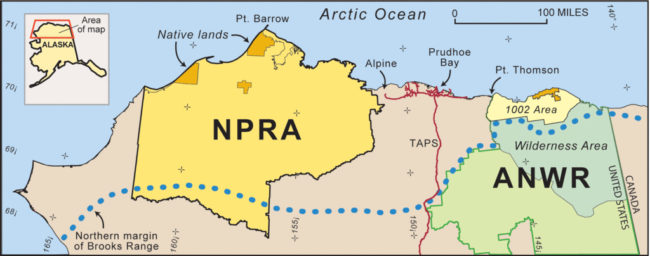
The Trump administration is making a lot more land in the National Petroleum Reserve-Alaska available for oil exploration this year.
On Wednesday, the Bureau of Land Management announced all 900 tracts set aside for leasing will be up for bid. That compares to just 145 tracts offered last year.
It’s the largest lease sale ever in the National Petroleum Reserve-Alaska, or NPR-A.
In the past, BLM decided which tracts to offer based on industry interest. But this year, Interior Secretary Ryan Zinke signed an order telling BLM to maximize the amount of land available for leasing in the Reserve.
Alaska’s congressional delegation praised the announcement.
“This decision is a testament to our work to spearhead new development and fight back against the status quo that has underserved Alaskan communities and interests for years,” Congressman Don Young said in a statement. “The NPR-A was always intended for development, not to be locked away in perpetuity like the previous administration attempted.”
An environmental group, however, said offering all the leases at once isn’t a good idea.
“Americans should not stand by and allow our public lands to be plundered without restraint,” Nicole Whittington-Evans of the Wilderness Society said in a statement. “We need a thoughtful, careful approach that emphasizes responsible development and recognizes that some places are simply too special to drill.”
Still, just under half of the Indiana-sized Reserve won’t be available at this year’s sale. The Obama administration decided to make that land off-limits to leasing, citing the need to protect important bird and caribou habitat.
The Trump administration is currently reviewing that decision.
The National Petroleum Reserve is seeing a spike in interest from the oil industry. There was a big increase in bids at last year’s BLM lease sale, spurred by a series of major oil discoveries around the northeast part of the Reserve.
This year’s lease sale will be held on December 6.
Elizabeth Harball is a reporter with Alaska's Energy Desk, covering Alaska’s oil and gas industry and environmental policy. She is a contributor to the Energy Desk’s Midnight Oil podcast series. Before moving to Alaska in 2016, Harball worked at E&E News in Washington, D.C., where she covered federal and state climate change policy. Originally from Kalispell, Montana, Harball is a graduate of Columbia University Graduate School of Journalism.




